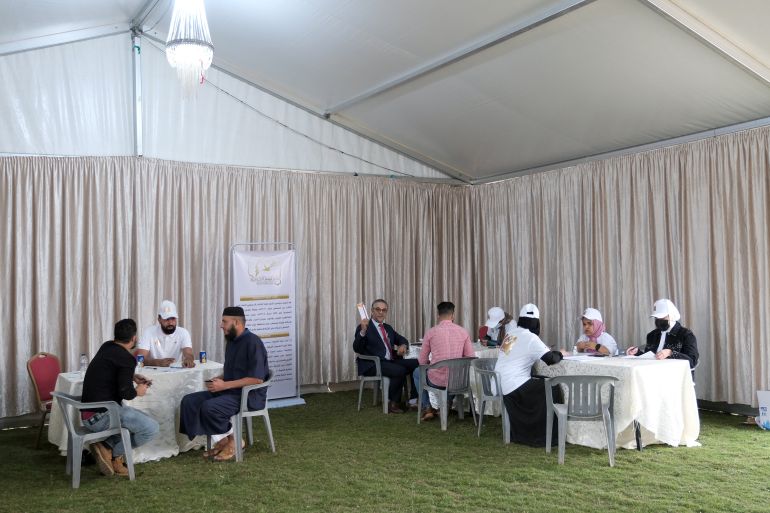Why Libya’s election got postponed: A quick guide
A look at the factors that have forced Libya to postpone a vote seen as crucial to end its 10-year-long crisis.

Libyans were scheduled to head to the polls on Friday for a presidential election that had long been marred by mounting challenges and disputes over rules and regulations.
After months of uncertainty, Libya’s electoral commission on Wednesday suggested the polls be pushed back by a month, as a parliamentary committee tasked with overseeing the process said it was impossible to hold the vote as originally planned.
Keep reading
list of 3 itemsHas the political process in Libya failed?
Libya electoral commission dissolves poll committees
Below, we take a look at some of the obstacles that have prevented the long-waited vote from happening and the challenges that lie ahead.
Why did the election get postponed?
The divided political class that emerged in the wake of the 2011 NATO-backed uprising against longtime ruler Muammar Gaddafi could not agree on the rules overseeing the election.
Furthermore, they failed to reach a consensus on what powers a new president or parliament would have and who could run in the vote.
Parliament speaker Aguila Saleh, who is a presidential candidate, issued a law setting a first round of the presidential election for December 24, followed by a runoff vote – if needed – and parliamentary polls.
Putting the presidential vote first meant the election would come down to a winner-take-all contest between candidates from virulently opposing factions.
Other political institutions rejected the law, accusing Saleh of passing the law without any proper parliamentary process.
However, Saleh’s law formed the basis of the electoral process and disputes over it grew even more as a number of divisive candidates entered the contest.
Who are the main candidates?
Some 98 candidates registered for the presidential race – including some who were seen as unacceptable by many in the country, including powerful armed factions.
Saif al-Islam Gaddafi, the son of former leader Muammar Gaddafi, registered despite a 2015 conviction in absentia by a court in the capital, Tripoli, of war crimes during the rebellion that overthrew his father 10 years ago.
Khalifa Haftar, a renegade military commander whose eastern-based forces waged a destructive 14-month offensive on Tripoli that ended last year, is rejected as a possible president by various armed factions and many people in western Libya.
Abdul Hamid Dbeibah, the interim prime minister, had promised not to stand for election as a condition to taking on a caretaker role earlier this year. Other candidates say his presence on the ballot is unfair. For him to be eligible, Dbeibah would have needed to have suspended himself from governmental duties at least three months before the polling date, which he did not do.
Without clear agreement on the rules, let alone on who would enforce them or adjudicate disputes, the electoral commission, the parliament’s election committee and the fragmented judiciary were unable to agree on a final list of eligible candidates.
What other challenges stand in the way of a vote?
Most of Libya is controlled by armed forces that back rival candidates. Without extensive independent monitoring, there would likely be claims of fraud or voter intimidation.
Two incidents last month showed the risks: Fighters closed a court to stop Gaddafi’s lawyers lodging an appeal against his disqualification, while the electoral commission said fighters had raided several of its offices, stealing voting cards.
A disputed result could rapidly unravel the peace process, replicating the aftermath of a 2014 election when warring factions backed rival administrations.
What next?
The electoral commission has proposed a one-month delay but the parliament may seek a longer one. Negotiations are continuing among the candidates, political institutions and foreign powers.
On Thursday, the parliament ordered the formation of a committee to create a roadmap and submit their proposal within one week.
A short delay may not be enough to resolve the arguments that derailed Friday’s vote. However, fixing those problems could require more time, raising questions about whether the interim government could stay in place until a new election is held.
The future of Dbeibah and his government during the coming period has rapidly become one of the main topics of dispute among rival camps.
“We were expecting that the elections weren’t going to happen on December 24, but now setting a new date will also be a contentious issue,” Adel Karmous, a member of parliament, told Al Jazeera. “From a legal standpoint, the parliament must agree with the High Council of State on a new date. The question now is how long will the postponement be for? And will they come to an agreement on a constitutional framework?”
Another conflict on the horizon?
If the peace process falls apart there is a risk that eastern factions could again form a breakaway government at war with Dbeibah’s administration in the capital, Tripoli. However, analysts think that is unlikely for now.
The more immediate risk is that a political crisis could add fuel to local disputes between rival armed groups that have mobilised in western Libya in recent weeks, leading to a new round of fighting inside the capital.